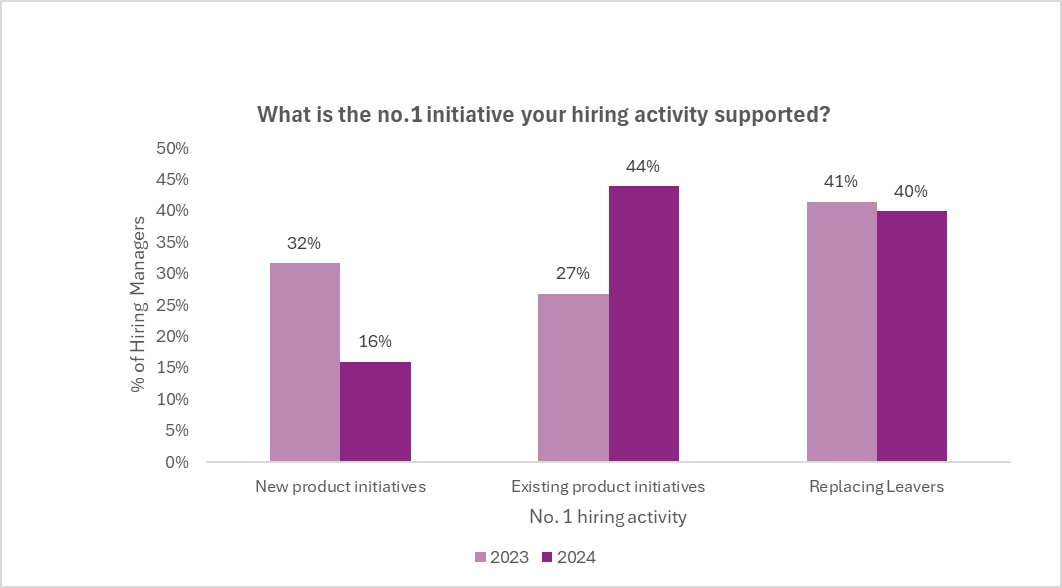Sarah, a seasoned Product Manager based in London, was laid off in January 2024. She had 5 years of experience in the industry, and had worked for a couple of well known brands, so was confident in landing a few interviews at least. She polished her CV, tailored cover letters to applications, and sent them off to a dozen roles.
Weeks passed. No replies. She was puzzled – something seemed off about the market.
She reached out to her network, and finally landed an interview.
Determined, she poured her heart into the preparation. Hours were spent researching the company’s goals and product strategy. She had a strong conversation with the hiring manager. Cracked the case study. Managed to impress the interviewees in the final ‘bar raiser’ interview.
And yet, after 5 rounds of what felt like really positive discussions, she was met with the same email she’s seen too many times: ‘We regret to inform you…’
Sarah isn’t alone. Thousands of product managers like her are stuck in the same cycle, facing a hiring process that feels impossible to crack.
We surveyed 50+ UK hiring managers to find out what’s going on with others like Sarah and how this will change in 2025.
TL;DR
- 📉 A tougher market, focused on growth: Hiring has shifted away from delivering new products to steady growth and sustaining existing initiatives. Product managers who’ve delivered real impact in similar domains are better positioned to thrive.
- 👩💼 The rising demand for Senior Product Managers is generating long-term risks: Senior Product Manager was the most in-demand Product role in 2024, with 65% of hiring managers prioritizing mid-level hires. This focus on steady growth is crowding out leadership roles and entry-level positions, creating long-term risks.
- 🚀 The evolving role of Product Manager – it’s more about bringing outcomes than injecting AI: The future of Product Manager isn’t in delivering outputs—it’s in driving business outcomes. Product Managers who can interpret analytics, connect the dots, and drive business outcomes are in highest demand. AI-specific roles remain exploratory.
- 🌟 Generalist advantage remains —with a catch: Hiring managers want versatile product managers, but those with domain expertise and experience stand out in crowded pipelines. The ability to hit the ground running is now essential.
- 🔥 Standouts are winning doing the basics – but brilliantly: With AI flooding inboxes with mediocre CVs, top candidates shine by crafting tailored applications, demonstrating hunger in interviews, and clearly articulating their ‘candidate-market’ fit – why they are best suited for the role. Hiring managers notice those who treat each role as the one.
- 🌤️ Glimmer of hope amid the gloom: 2/3 of hiring managers expect conditions to improve or stay flat in 2025, with some industries like Insurance are thriving, even as sectors like telco consolidate.
A tougher market focused on sustained growth
Here's what everyone gets wrong about the current market: It's not that companies completely stopped hiring – they have changed what they're hiring for.
Over the past several years, company funding and product hiring was driven by the promise of hypergrowth. More users, more revenue, more teams—more everything. Welcome to the age of cautious hiring, where efficiency beats expansion.
In 2024, only 16% of hiring managers said new product initiatives were their top priority (down from 32% in 2023). Instead, companies are obsessed with efficiency—optimizing, streamlining, and making existing bets work harder.
This may well change as the market gloom lifts, but for now, it is product managers who’ve driven measurable impact in companies' core domains that are better positioned to find jobs.
Senior Product Managers are winning, but it’s a short-term fix
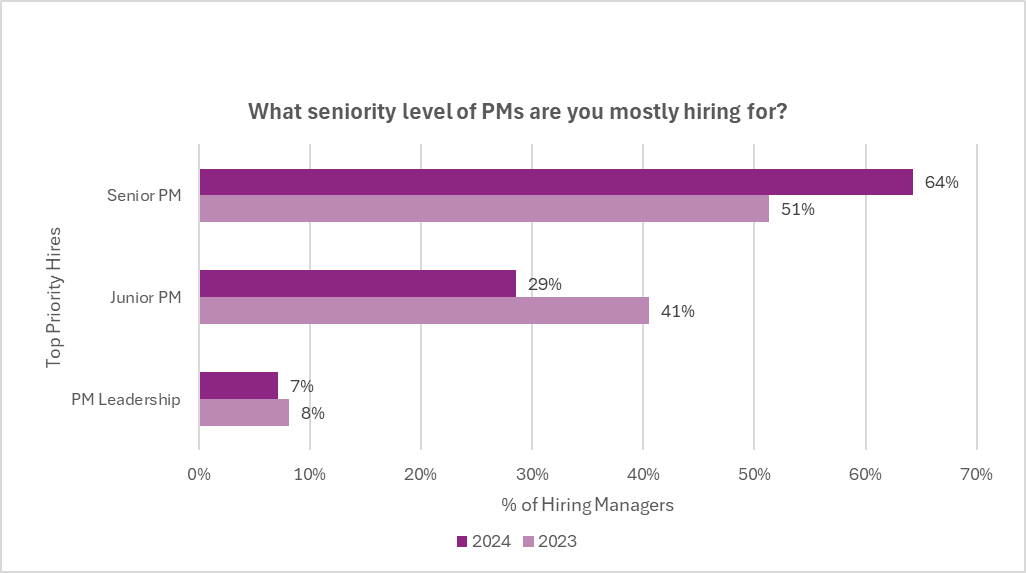
The hottest job title in 2024? Senior Product Manager. Demand for Senior Product Managers has shifted upward by 13% YoY. Why? Companies want plug-and-play product managers who are experienced enough to drive near-term results but not so senior that they demand VP-level pay.
But here’s the problem: this hiring strategy is short-sighted.
- Leadership hiring has stalled, meaning there’s no one coaching the mid-level hires.
- Junior Product roles are disappearing, meaning there’s no pipeline for future leaders.
- The industry is setting itself up for a leadership vacuum in a few years.
Why is this happening? Product leaders are typically hired in two scenarios: hypergrowth or strong consolidation. Right now, the market is playing it safe—no wild expansions, no major restructurings. That means the demand for product leadership is lukewarm at best.
The market caution also explains why jobs and recruiters seem to disappear mid-way through the interview process. Some companies are grappling with this uncertainty every day, with hiring managers having to explain every headcount after they thought their roadmap was approved.
As for junior product managers? They thrive when companies are willing to take a bet on new talent. Traditionally, large tech-native companies have filled this gap through dedicated Associate Product programs, fostering fresh talent into the pipeline. But right now, companies aren’t in the mood to nurture—they’re in the mood to deliver.
“I understand why only hiring experienced Senior Product Managers might seem attractive, but this is very short-sighted. These senior product managers will have no opportunity to develop leadership skills, will all be competing for the same small pool of leadership opportunities, and the industry as a whole will suffer from the resulting lack of a pipeline of upcoming product managers” – Thor Mitchell, CPO-Exec-in-Residence, Balderton Capital/ex Miro.
Product Managers need to drive outcomes—not just bring AI
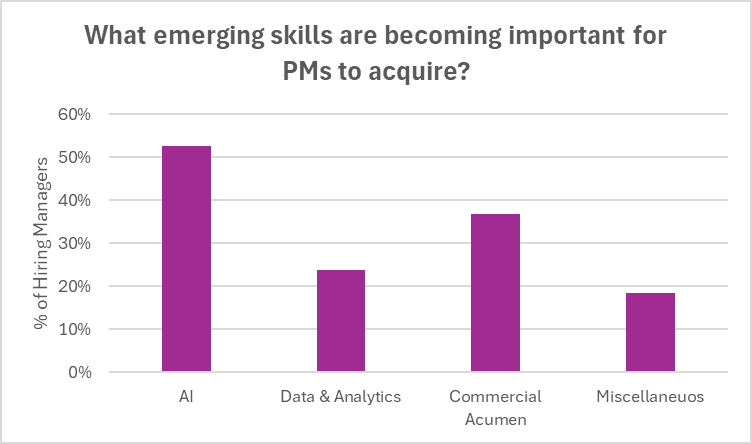
AI seems to be everywhere in both product job descriptions and hiring discussions. In fact, over 50% of product managers think it is an emerging skill that product managers need to acquire. But let’s separate hype from reality – what is an ‘AI skill’, really? Marily Nika, formerly an AI Product Lead at Google and AI Product Manager at Meta, classifies AI product managers into 3 buckets:
- Core product managers implementing AI into their product
- Growth product managers implementing AI to optimize part of a product
- AI product managers managing an AI model or AI team
While AI Product Managers are being hired across all 3 buckets, hiring managers admit they’re still experimenting rather than scaling AI-driven product teams, with only a small subset of specialist product roles being focused entirely on AI.
What actual skills do product managers need? Using Data & AI to enhance their own productivity—whether this is by:
- Generating rapid prototypes with AI tools like Loveable or Bolt to accelerate discovery.
- Automating workflows or producing more data-backed artefacts with ChatPRD to drive clarity in decision-making.
“Early in the mobile era, there was a rush to hire mobile product managers. Over time, mobile expertise became a fundamental expectation rather than a specialized skill. I expect the same with AI—right now, AI specialization is a differentiator, but soon it will be table stakes. The real shift isn’t about AI—it’s about commercial awareness. Product Managers who truly stand out are those who can connect AI advancements to business outcomes, not just understand the technology.” – Martin Schwitzner, Product Leader and Advisor, DELLI/ex Marshmallow.
The other foundational skill that is increasingly important? Data literacy. Product managers who can analyze metrics, connect insights to strategy, and drive actionable results are the ones getting hired.
“The reality is that I am being stretched as a Product leader more than ever, so I expect product managers to take on more of an analytical role. Tell me what metrics are driving business value. What do our experiment results reveal about customer behavior and product direction? If you can bring me these insights, I can focus more clearly on strategy.” – Hannah Simpson, Head of Product, Waggel.
The overarching theme seems to be the same – future product skills need to more clearly follow the ‘T-shape’ with greater strategic alignment with business priorities – this paves the way for future CPO, CFO or even CPTO roles.
Generalists advantage remains — with a catch
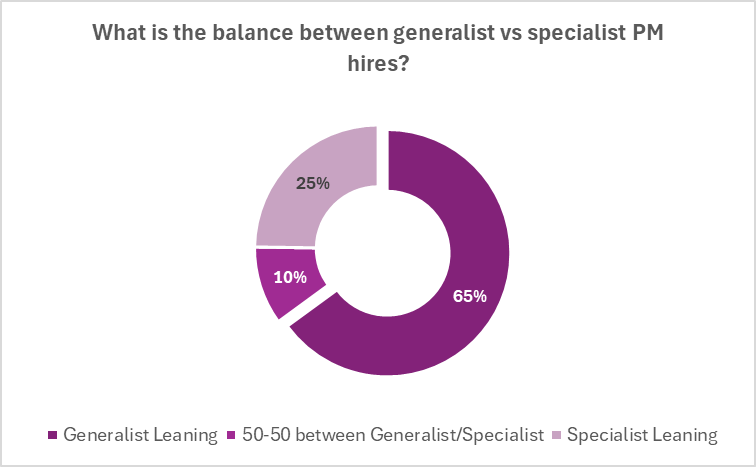
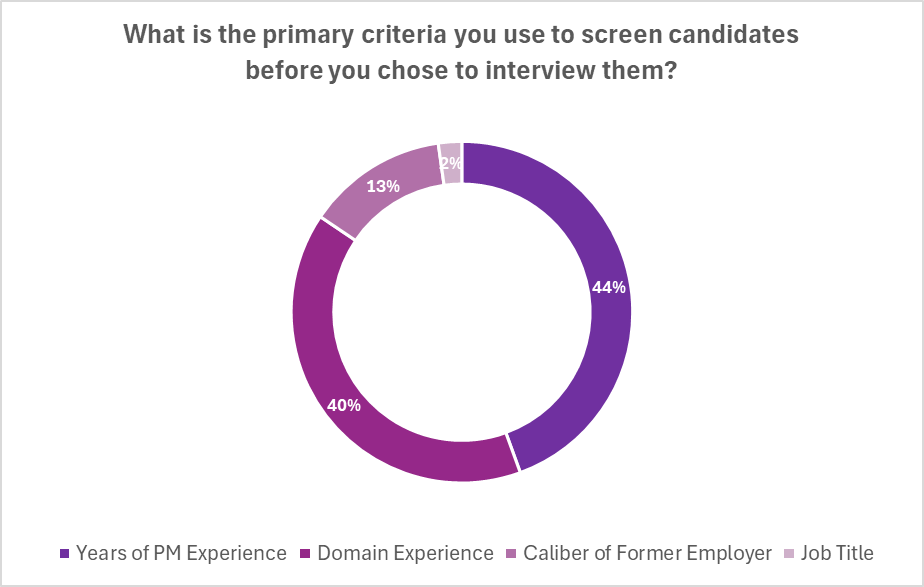
For years, the debate has raged: Generalist vs. Specialist. Generalists are adaptable, bring strong foundational product skills, and are capable of working across different industries or problem spaces. Specialists bring deep expertise in a specific domain, such as AI, consumer products or enterprise SaaS. In 2024, this has evolved into something more nuanced. Here's what's really happening:
- Hiring managers advise that 65% of the product managers they have hired over the last 2 years are generalists. 40% of candidates are at risk of rejection at screening stage without domain experience.
So what explains this? Given the volume of CVs flooding the application funnel, hiring managers are being forced to choose additional filters, and it is inevitably product managers with relevant industry experience that win out.
“We always say we want generalist product managers—broad thinkers who bring fresh perspectives, resourcefulness, and adaptability. But hiring rarely happens in a vacuum. When a role opens, it’s almost always to fill an immediate, high-priority gap. That means we look for specialists—someone who can hit the ground running, often with deep industry expertise or experience at a competitor. The reality is, while we value long-term versatility, short-term pressures from investors and leadership push us toward hiring for urgent needs.” – James Effarah, Head of Product, Odicci.
This doesn’t necessarily mean product managers should choose to specialise (indeed, some roles are TRULY specialist), but rather, the majority need strong breadth and depth. Recruiters who are filtering out candidates will only spend a handful of seconds reviewing, so to truly stand out, candidates need to demonstrate:
- They have solved problems in similar domains (e.g., Fintech, Healthcare).
- Brought strong results in similar business models (B2B, B2C, etc.).
- Track record of quick adaptation to culture (e.g., if applying to early-stage companies, prior experience of operating in fast-paced environments).
The best candidates nail the basics—but brilliantly
Screening is just one part of the hurdle. Now, hiring managers have become pickier than ever. The strongest candidates? They do the fundamentals better than everyone else – here’s what hiring managers say about product managers who stand out:
🎉 Enthusiasm Is easy to spot: “You can tell when a candidate has real, genuine enthusiasm for the role," one manager said. Passionate candidates brought energy, asked thoughtful questions about the company, and showed genuine excitement during interviews. They had done extensive research on the industry and could present a clear view of the market.
🏛️Clarity and structure win: The best candidates present responses that are concise, structured, and backed by data without blind allegiance to frameworks—be it for case studies or any behavioural questions thrown at them. A large part of product jobs is inevitably about bringing clarity amidst ambiguity, and product managers who can demonstrate they think clearly stand out.
🦸Reveal your superpower: Hiring managers loved candidates who could demonstrate clearly what they had that others didn’t – be it a strong depth of knowledge around an industry or experience gained through having solved that specific problem before. ’They understood the problems we'd face before joining the business. It was obvious from speaking to them that they had done this before, a hiring manager revealed.
💯Impact speaks louder than titles: Hiring managers care about outcomes more than ever before, and the strongest candidates were evident changemakers who could articulate how they had delivered results in their previous roles. ‘They can present really strong answers as you dig into their experience- the best have both depth and breadth – give a sense you can throw anything at them’.
The takeaway? In a competitive market, hiring managers notice candidates who focus on the fundamentals—but execute them brilliantly.
A glimmer of hope for 2025
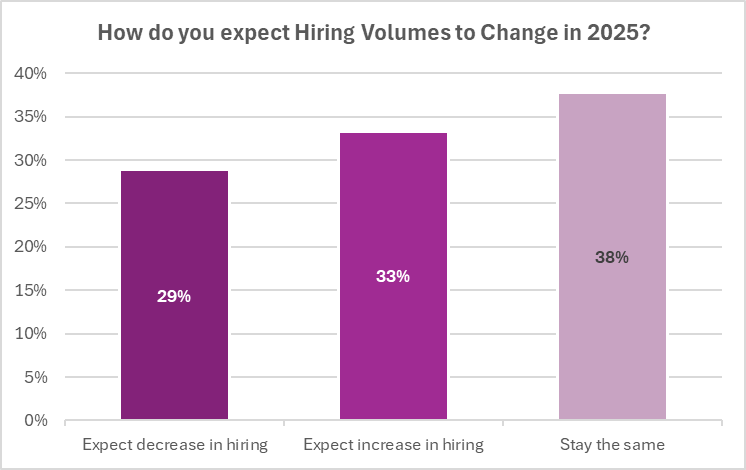
The chaos in the hiring market isn’t over, but the worst might be. Two-thirds of hiring managers expect the market to stabilize or improve in 2025. This trend, though, is not uniform across industries.
Industries like fintech and insurance are hiring more aggressively, particularly as consumers are looking at products that help them manage their finances in a cautionary market. Revolut, for example, were expected to boost their headcount by 40% in 2024. Others like telco and retail are still facing layoffs after several quarters of slow growth.
Companies are still investing in product—but they’re being more selective. Product managers who can clearly articulate their impact and connect their experience to business value will always have a competitive edge.
Final thoughts
The UK product job market is evolving. The hiring process is brutal, the competition is fierce, and expectations are higher than ever. But the rules haven’t changed.
For hiring managers, the path forward is clear. The most successful teams in 2025 won't be built through rigid criteria or endless rounds of theoretical exercises. They'll come from being upfront about what matters – whether that's domain expertise, efficiency, or fresh perspectives. The best candidates are drawn to clarity, not complexity. The market may be challenging, but it rewards those who embrace honest conversations. For job seekers, 2025 isn’t about playing the volume game. It’s about precision. Find the right role, tell the right story, and show why you’re the best candidate in the pile. That’s how you get hired.
Read more on the product management job market


